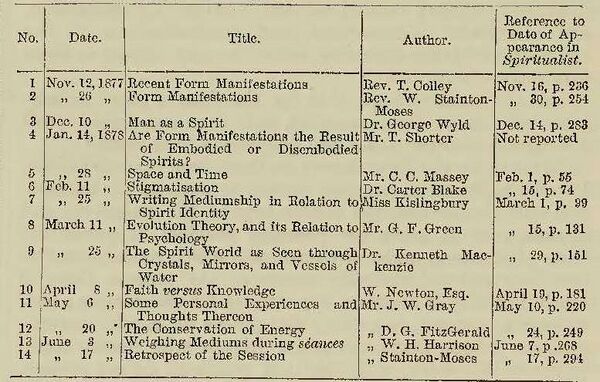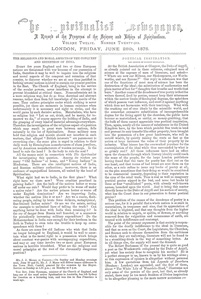< Retrospect of the Session of Fortnightly Spiritualistic Discussion Meetings, 1877-1878 (continued from page 7-166) >
Such is the record of our past session; one, I confidently submit, that we have no cause to be ashamed of. Among the many good works accomplished by this Association I know none the fruits of which are more manifest. I very much regret that no permanent record of the discussions which have followed the several papers, has been preserved. We are indebted to the Editor of The Spiritualist for printing the papers themselves, and they have been not the least interesting portion of the matter which is laid before the readers of that journal. There are many difficulties, in the way of reporting the discussion, but I hope they are not insuperable. In the course of another session some means may, I trust, be devised for preserving some record of the criticisms and opinions expressed. One obvious reason among many is this:—A paper, containing sometimes views which are put forward for the purpose of eliciting discussion, goes forth without any record of the criticism passed upon it, and so appears in a false light, unchallenged and, as it were, with the imprimatur of approval stamped upon it. This leads to misconception, and should be avoided. Moreover, some most valuable hints and suggestions thrown out in discussion are lost, and those who are not present at the reading of the paper lose much of its value, even if they do not carry away an erroneous notion of the feeling of the meeting.
I hope that a still more completely organised plan may be carried out in our next session, and that it may be arranged to prepare a list of subjects, with the names of persons who will promise to give us the benefit of their experience upon them, so that a programme may be published at the beginning of the session. This is the plan adopted at the Royal Institution, and it has obvious advantages. Instead of desultory papers, we should then be able to secure an exhaustive treatment of the questions with which we are concerned: members would be attracted by an orderly plan such as we could put forward, and would know what to look forward to. If the results could be collected and published in a cheap form at the close of the session another great boon would be secured for the intelligent and inquiring Spiritualist.
The complete list of papers read during the session is as follows:—

The Religious and Moral Aspects of the Conquest and Retention of India
Every few years England and two or three European nations are threatened with war because of our possession of India, therefore it may be well to inquire into the religious and moral aspects of the conquest and retention of that country, to discover whether we are at any time justified in bathing several nations in blood to sustain our present position in the East. The Church of England, being in the service of the secular powers, never interferes in the attempt to prevent bloodshed at critical times. Nonconformists act in a more religious way, but do go from doctrinal and abstract reasons, rather than from full knowledge of the merits of the case. They enforce principles under which striking is never possible, yet there are moments in human existence when unfortunately it is necessary and right' to strike, and the world gains by such decisive action. Materialists, who have no religion but “Let us eat, drink, and be merry, for tomorrow we die,” of course approve the holding of India, and the grasping of every kind of material advantage everywhere. Therefore the investigation of the religious aspect of a position which may result in great wars between nations, falls naturally to the lot of Spiritualists. Some military men hold that religion and morals should not interfere in such matters, that alleged “British interests” are paramount to everything else; the same plea is urged in relation to their daily work by Birmingham manufacturers of sham jewellery, and by American manufacturers of wooden nutmegs. Is the hand to rule the head? Is the body to rule the soul?
All the means exist in connection with The Spiritualist for investigating this question. Among its readers are many “Old Indians” at home, and “Young Indians” in Hindostan. There are also intelligent natives of India, and Kussian military authorities; moreover, there is an I audience of unprejudiced listeners, all united by the bond of Spiritualism.
What right had we to India, in the first place? What right have we there now? Were cruelties practised ingaining India? Are the bulk of the natives better or worse off under our rule? Would they prefer to be worse off under a native ruler? Are the native princes better or worse off under English domination? Are we improving India, whether the natives like it or not? Are we a coarse, flesh-eating people, ruling by brute force delicate, metaphysical, fine-brained Indian saints? Or are we the saints, setting the example to unlimited liars of telling the truth? Can anything better be done with India than retaining it? Is the cry of danger from Russia well founded, or a scarecrow for periodically increasing military expenditure? Do the Mohammedans in India care enough for their brethren in the faith in Turkey to even take the trouble to keep up correspondence with them?
As there are some few old Indians who wish that India no longer belonged to England, it would be well to ascertain what is the moral right to a possession which brings about constant war-panics with accompanying expenditure, and may at any time involve two or more great European nations in horrible bloodshed. What are the religious and moral principles at the root of the chronically dangerous position?

Editor's notes
Sources
-
London Spiritualist, No. 305, June 28, 1878, p. 301


